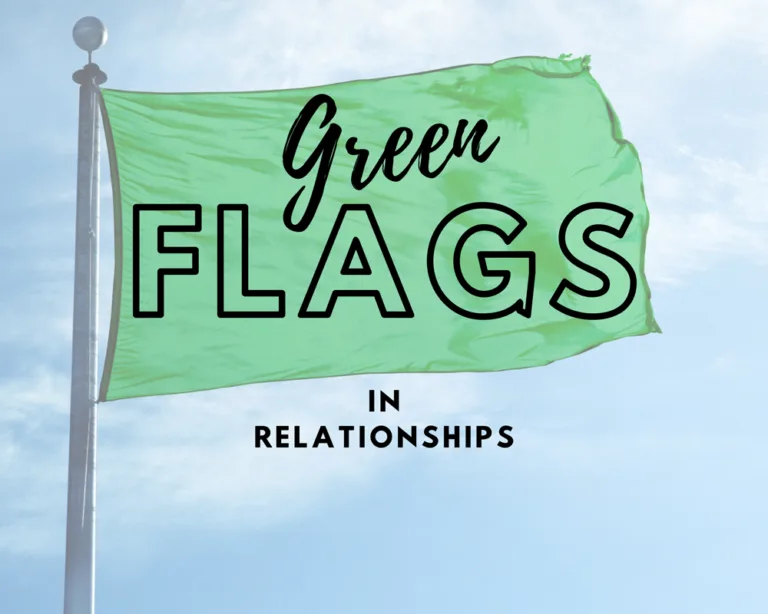Last Updated on July 26, 2023
10 Green Flags That Are Signs of a Healthy, Fulfilling Relationship
When it comes to relationships, it’s important to focus not only on the red flags but also on the green flags. While red flags indicate potential trouble, green flags are the signs of a healthy and loving partnership that can lead to a successful and fulfilling future.
Green flags are the positive qualities and behaviors that partners exhibit in a relationship. These include open and honest communication, accountability, mutual respect and understanding, emotional support and encouragement, and the ability to make each other laugh and have fun together. These behaviors promote emotional bonding and intimacy, fostering a deeper level of connection and understanding within the relationship.
Here are some of the green flags to look for in a relationship:
1. Open and honest communication
Open and honest communication is one of the most crucial components of a healthy and fulfilling relationship. It involves the willingness to share one’s thoughts and feelings with their partner in a transparent and truthful manner. This level of communication requires vulnerability and trust, as both parties must be willing to open up and share their innermost thoughts and emotions.
In a relationship with open and honest communication, both partners feel heard and understood. They can share their joys, fears, and concerns without fear of judgment or rejection. This level of trust and understanding fosters a deep connection between partners and promotes intimacy. In addition, open communication is essential for resolving conflicts and misunderstandings. When both partners can express their grievances and concerns non-judgmentally, they can work together to find a resolution that benefits the relationship as a whole. This level of collaboration and compromise is essential for maintaining a healthy and harmonious partnership.
On the other hand, a lack of honest communication can lead to misunderstandings and mistrust. When partners are unable or unwilling to share their thoughts and feelings, they may become distant or withdrawn, leading to a breakdown in the relationship.
2. Accountability

Accountability is a fundamental element of a healthy and successful relationship. It involves taking responsibility for one’s actions, words, and behaviors and accepting the consequences of one’s choices. When both partners are accountable, they demonstrate respect and consideration for each other, creating a foundation of trust and mutual respect.
In a relationship, accountability means acknowledging mistakes and making amends to the best of one’s ability. It means holding oneself accountable for their part in a conflict and being willing to work towards a resolution that benefits the relationship. By taking ownership of their actions, partners can build trust and strengthen their bond.
Accountability involves setting clear boundaries and expectations for the relationship. When both partners are accountable, they communicate openly and honestly about their needs and expectations, which helps to prevent misunderstandings and conflicts. In a relationship where accountability is present, partners feel safe and secure, knowing they can rely on each other to take responsibility for their actions. They are more likely to feel supported and valued, promoting a deeper connection and understanding.
A lack of accountability can lead to a breakdown in the relationship. When partners are unwilling to take responsibility for their actions, at best, it can be a sign of emotional immaturity on their part, at worst, a possible personality disorder like narcissism. It can lead to resentment, mistrust, and conflict. This can create a toxic environment, damaging the relationship and eroding the foundation of trust and respect.
3. Confident and secure in themselves and you
Being confident and secure in oneself and one’s partner involves having a sense of self-worth and self-respect while also feeling valued and respected by one’s partner. When both partners are confident and secure, they can build a strong and lasting relationship, free from the insecurities and doubts that undermine trust and intimacy.
In a relationship where both partners are confident and secure, there is a sense of mutual support and encouragement. Each partner feels comfortable being themselves and expressing their thoughts and feelings without fear of judgment or rejection.
When both partners are secure in themselves and each other, they can weather the ups and downs of the relationship with grace and understanding. They can support each other through difficult times, knowing that their bond is strong enough to withstand any challenges that may arise. This level of security and confidence allows for a more harmonious and fulfilling relationship.
4. Being each other’s safe space
Being someone’s safe place in a relationship is vital to building a solid and lasting partnership. It involves creating an environment where both partners feel emotionally supported, understood, and valued. When one partner feels safe and secure with their significant other, they are more likely to open up and share their innermost thoughts and feelings, promoting intimacy and trust.
In a relationship where one partner is someone’s safe place, they provide a sense of emotional safety and security. This means listening, offering support, and providing comfort when needed. They create a space where their partner can express themselves freely without fear of judgment or rejection.

Being a safe place for your partner involves being trustworthy and dependable. When a partner feels safe, they know they can rely on them to be there when needed, whether for emotional support, practical help, or to listen. In a healthy relationship, both partners should strive to be each other’s safe place. This means being a source of emotional support, understanding, and encouragement. When both partners feel safe and secure with each other, they can build a deep and meaningful connection.
5. Validate your emotions
Partner validation of emotions is the ability of one’s partner to acknowledge and understand their feelings, providing support and comfort during difficult times. A partner validating their significant other’s emotions promotes emotional safety and security, fostering intimacy and trust.
In a relationship where a partner validates their significant other’s emotions, there is a sense of mutual understanding and respect. Each partner feels heard and understood, knowing their emotions are important and valued. This level of emotional support creates a space where both partners can express themselves freely, promoting a deeper level of connection and understanding.
Partner validation of emotions involves empathy and compassion. When a partner validates their significant other’s feelings, they put themselves in their shoes, imagining how they would feel in the same situation. This level of understanding and empathy promotes a more harmonious and supportive partnership where both parties feel comfortable expressing themselves.
In a healthy relationship, both partners should strive to validate each other’s emotions. This means listening, understanding, and acknowledging their partner’s feelings, even if they don’t always agree. When both partners validate each other’s emotions, they create a deeper level of connection and understanding, promoting intimacy.
6. Respect and remember your boundaries
When a partner respects and remembers your boundaries in a relationship, it is a good sign that they value and care about your feelings and needs. It demonstrates a level of emotional maturity and consideration. Respecting and remembering boundaries involves being aware of your partner’s limits and honoring them without judgment or criticism. This means listening to your partner’s needs and opinions, even if they differ from your own, and being willing to compromise to create a harmonious relationship.
When a partner remembers and respects your boundaries, it creates a sense of trust and safety within the relationship. You feel heard, understood, and valued, promoting a deeper connection and understanding. This level of respect and consideration promotes emotional bonding and intimacy, fostering a stronger and more fulfilling partnership. It shows they are willing to put your needs and well-being above their desires. This level of selflessness is essential for building a relationship based on mutual respect and understanding.
7. They are not afraid to discuss the future with you
When a partner is not afraid of discussing the future with you in a relationship, it is a good sign that they are committed to the partnership and invested in building a future together. It demonstrates a level of trust and openness. Discussing the future involves being willing to share one’s goals, dreams, and aspirations with their partner. It means being willing to plan for the future, make decisions together, and work towards a shared vision of the future. When both partners are open and ready to discuss the future, it creates a sense of shared purpose and direction within the relationship.
When a partner is not afraid of discussing the future with you, it shows they are willing to invest time and energy into the relationship. They see a future with you and are eager to work towards it. This level of commitment and dedication is crucial for building a lasting and fulfilling partnership. Discussing the future involves being honest and transparent with one’s partner. It means being willing to have difficult conversations about important topics such as marriage, children, and career aspirations. When both partners are open and honest with each other, it promotes a deeper level of emotional bonding.
8. Respect your morals and beliefs
When a partner respects your morals and beliefs in a relationship, it can make you feel valued, understood, and appreciated. It demonstrates a level of emotional intelligence and maturity. Respecting your morals and beliefs involves acknowledging and honoring your values, even if they differ from your partner’s own. This means listening to your perspective, being open-minded, and being willing to have honest and respectful discussions about important topics.
When a partner respects your morals and beliefs, it creates a sense of safety and security within the relationship. You feel heard and understood, promoting a deeper connection and understanding. This level of respect and consideration promotes emotional bonding and intimacy, fostering a stronger and more fulfilling partnership. It shows that they are willing to accept and appreciate you for who you are. It means they value your individuality and are committed to building a relationship based on mutual respect and compassion.
9. Make you want to be a better you
When a partner makes you want to be the best version of yourself in a relationship, it is a good thing because it demonstrates a level of encouragement, support, and motivation that is an integral part of a relationship. Being the best version of oneself involves striving for personal growth, self-improvement, and self-awareness. It means setting goals, working towards them, and constantly challenging oneself to be better. When a partner encourages and supports these efforts, it creates a sense of motivation and inspiration that can help to achieve these goals.
When a partner makes you want to be the best version of yourself, it creates a sense of accountability and responsibility within the relationship. You feel motivated to be the best version of yourself, not just for yourself but also for your partner. It shows that they are invested in your personal growth and development. They want to see you succeed and be happy and are willing to support you in any way possible. This level of dedication and commitment is crucial for a long-lasting relationship.
10. They remember the little things

Remembering the little things in a relationship makes you feel valued, loved, and appreciated. It demonstrates a level of attentiveness, thoughtfulness, and consideration. Remembering the little things involves paying attention to your partner’s preferences, interests, and needs and trying to incorporate them into your daily interactions. This can range from remembering a special date or event to knowing your partner’s favorite foods, colors, or activities.
When a partner remembers the little things, it creates a sense of warmth and affection within the relationship. You feel seen and understood, promoting a deeper connection and understanding. The consideration shows they are willing to go above and beyond to make you happy. It means they value your happiness and are committed to building a relationship with you.
When both partners exhibit green flags, it creates a sense of safety, security, and trust within the relationship. You feel valued and appreciated, which promotes deeper emotional bonding and understanding. This level of emotional connection can lead to a more fulfilling and satisfying relationship, fostering a sense of mutual support and growth. Furthermore, green flags can also indicate a willingness to work together to overcome challenges and obstacles in the relationship. When partners exhibit green flags, they demonstrate a level of emotional maturity and consideration that is essential for building a healthy and fulfilling partnership.
It’s important to focus not only on the red flags in a relationship but also on the green flags. When a relationship exhibits more red flags than green flags, it can lead to a breakdown in the relationship. This can manifest as a lack of trust, emotional distance, and even resentment. Ultimately, it can undermine the foundation of the relationship. Conversely, when both partners exhibit green flags, it creates a space of trust, understanding, and mutual respect, fostering a deeper level of emotional bonding and intimacy.

